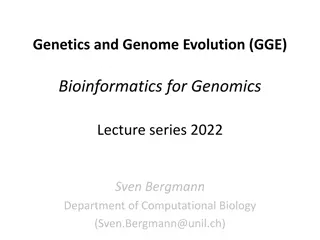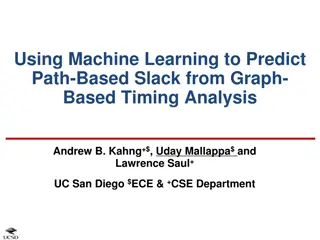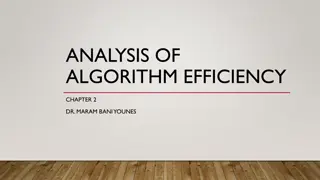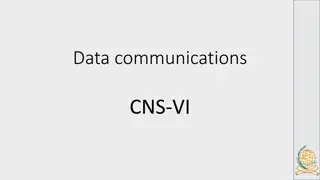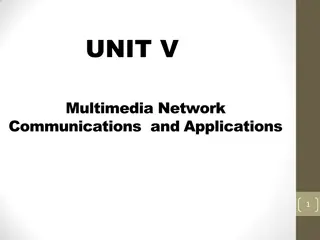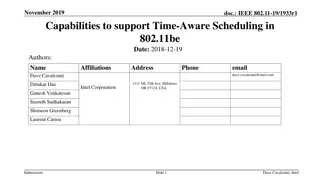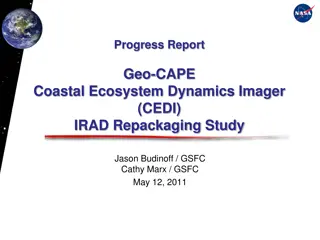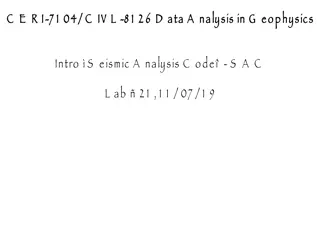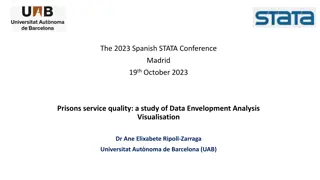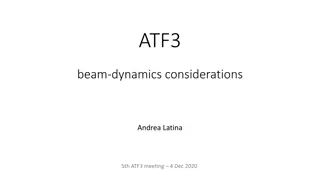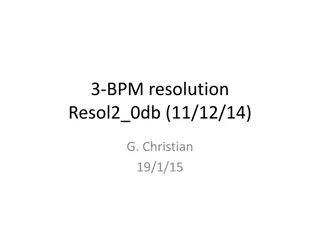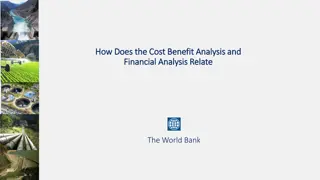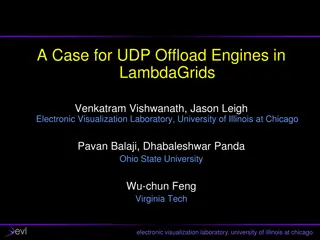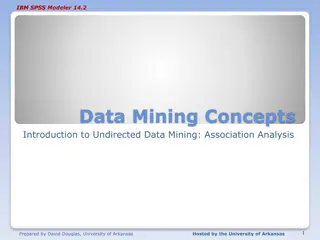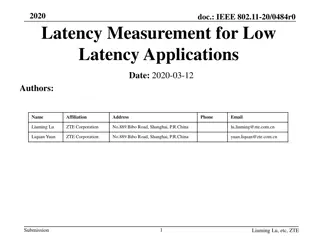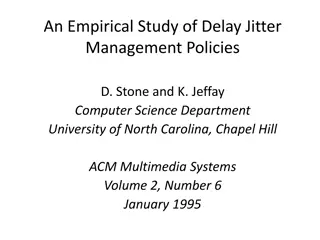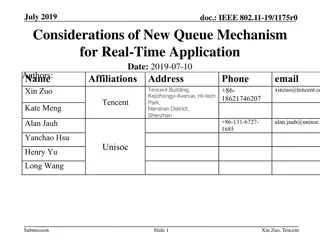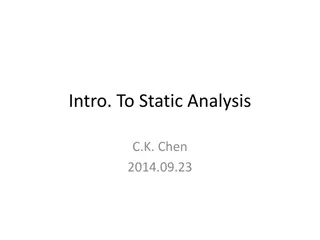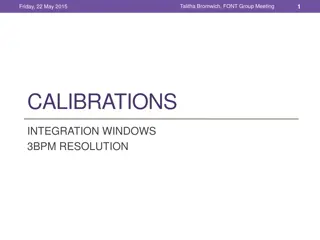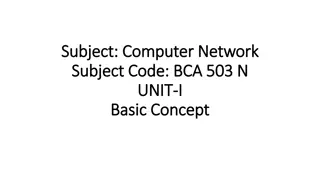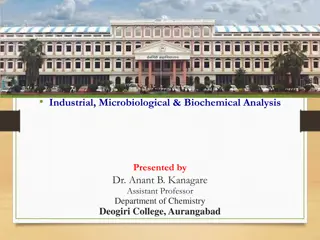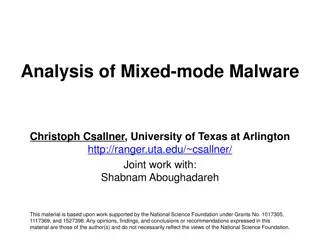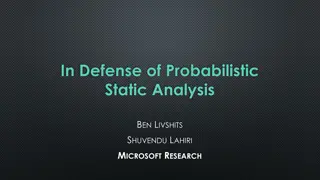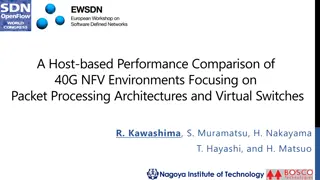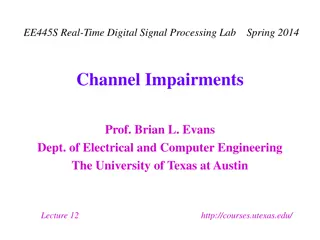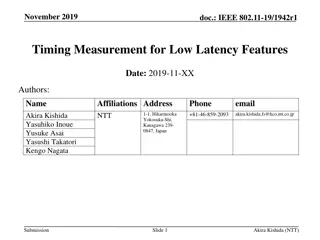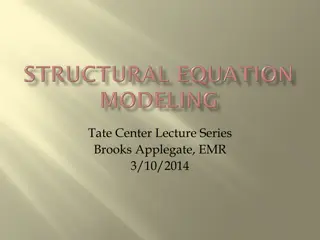Network Behaviour & Impairments
The impact of network behavior, latency, jitter, and loss on network performance. Understand the challenges and factors affecting the shared experience.
0 views • 39 slides
Algorithm Analysis
Algorithm analysis involves evaluating the efficiency of algorithms through measures such as time and memory complexity. This analysis helps in comparing different algorithms, understanding how time scales with input size, and predicting performance as input size approaches infinity. Scaling analysi
1 views • 30 slides
Market Analysis (Project Formulation)
This detailed guide covers essential aspects of market analysis and project formulation in entrepreneurship, including feasibility analysis, techno-economic analysis, market demand analysis, steps in market analysis, and factors to consider for market demand analysis. Explore how to assess market de
2 views • 30 slides
Object-Oriented Analysis and Design Workflow
Object-Oriented Analysis (OOA) is a crucial step in software development to produce a logical model of the system's functionality. It involves requirements analysis, use case analysis, and use case realization to identify classes, responsibilities, attributes, and associations. The process includes
11 views • 90 slides
Static Analysis Techniques Overview
Explore static analysis techniques such as syntactic analysis, dataflow analysis, and model checking. Understand the concept of basic blocks in static analysis and their boundaries. Dive into the opportunities provided by static analysis in summarizing program behavior without executing it.
9 views • 27 slides
Enhancing R-TWT with Multi-AP Coordination in IEEE 802.11 Networks
Delve into the world of IEEE 802.11 wireless networks as this document explores solutions for multi-AP coordination for R-TWT, focusing on improving tail latency, jitter, and medium protection. Enhancements in R-TWT operation, coordination scenarios, and solutions for multi-AP deployments are discus
1 views • 12 slides
Bioinformatics for Genomics Lecture Series 2022 Overview
Delve into the Genetics and Genome Evolution (GGE) Bioinformatics for Genomics Lecture Series 2022 presented by Sven Bergmann. Explore topics like RNA-seq, differential expression analysis, clustering, gene expression data analysis, epigenetic data analysis, integrative analysis, CHIP-seq, HiC data,
0 views • 36 slides
Comprehensive Cost Management Training Objectives
This detailed training agenda outlines a comprehensive program focusing on cost management, including an overview of cost management importance, cost object definition, cost assignment, analysis, and reporting. It covers topics such as understanding cost models, cost allocations, various types of an
2 views • 41 slides
Machine Learning for Predicting Path-Based Slack in Timing Analysis
Utilizing machine learning to forecast path-based slack in graph-based timing analysis offers a solution for optimizing power and area efficiency in the design process. The Static Timing Analysis incorporates accurate path-based analysis (PBA) and fast graph-based analysis (GBA) to estimate transiti
1 views • 31 slides
Understanding Algorithm Efficiency Analysis
In this chapter, Dr. Maram Bani Younes delves into the analysis of algorithm efficiency, focusing on aspects such as order of growth, best case scenarios, and empirical analysis of time efficiency. The dimensions of generality, simplicity, time efficiency, and space efficiency are explored, with a d
1 views • 28 slides
Qualitative Data Analysis Techniques in Research
The purpose of data analysis is to organize, structure, and derive meaning from research data. Qualitative analysis involves insight, creativity, and hard work. Researchers play a crucial role as instruments for data analysis, exploring and reflecting on interview discussions. Steps include transcri
1 views • 27 slides
Fundamentals of Data Communications: Characteristics and Components
Data communications involve the exchange of data between devices through transmission mediums. The effectiveness of a data communications system relies on key characteristics like delivery, accuracy, timeliness, and jitter. The system components include the message, sender, receiver, transmission me
0 views • 63 slides
Understanding Multimedia Network Communications and Applications
Multimedia network communications involve high data rates, real-time interaction, and varied quality of service parameters like data rate, latency, packet loss, jitter, and synchronization. Different multimedia service classes cater to specific requirements such as real-time, priority data, silver,
0 views • 22 slides
Time-Aware Scheduling Capabilities in IEEE 802.11be
Describing necessary enhancements to enable Time-Aware Scheduling in IEEE 802.11be for time-sensitive applications. The focus is on aligning with the 802.1Qbv standard to address latency, jitter, and reliability issues, presenting a structured outline of requirements and configurations essential for
0 views • 24 slides
- Geo-CAPE Coastal Ecosystem Dynamics Imager (CEDI) IRAD Repackaging Study
- The Geo-CAPE Coastal Ecosystem Dynamics Imager (CEDI) is undergoing a repackaging study to reduce its volume for compatibility with various missions. The study aims to define a scientifically viable mission by evaluating architecture and packaging trades. It compares the volume of the Geo-CEDI to
0 views • 13 slides
Introduction to Data Analysis in Geophysics with Seismic Analysis Code - SAC Lab 2.1
Explore the world of geophysics data analysis using the SAC Lab 2.1 code. Learn about seismic analysis, Fourier transform analysis, spectral analysis, color tracing, integration, differentiation, and more. The SAC online documentation provides valuable resources for users to delve deeper into this f
0 views • 45 slides
Data Analysis and Passage Analysis Project Proposal
This project proposal by Anthony Yang focuses on developing a Java program for data analysis and passage analysis. The motivation behind the project is to gain more knowledge in computer science and statistics-related topics while utilizing technology to extract useful insights from data. The propos
0 views • 8 slides
Efficiency Methodological Approaches in Prisons Service Quality Study
Exploring efficiency methodologies in analyzing prisons service quality, this study focuses on parametric and non-parametric approaches such as Data Envelopment Analysis (DEA) and Stochastic Frontier Analysis (SFA). It delves into benchmarking techniques, productivity analysis, and the implications
0 views • 21 slides
Challenges in ATF3 Beam Dynamics Considerations by Andrea Latina
The final focus system in a linear collider, such as ATF3, is challenging due to imperfections like wakefields, magnets misalignment, and beam jitter. The design goals at ATF2 were ambitious but faced difficulties in achieving the desired beam size. Imperfections like dipole/quadrupole misalignment,
0 views • 7 slides
Analysis of Resolution and Residuals in Experimental Data
This document presents an analysis of experimental data including resolution figures, residuals from fitting, and positional jitter. It explores single point analysis, charge references, and resolution as a function of sample number. The data is thorough and detailed, providing insights into the acc
0 views • 13 slides
Understanding Implications of Broadband Quality on Digital Markets
Exploring the impact of broadband quality of service on digital markets, focusing on legal and regulatory tools, payment mechanisms, delivery mechanisms, and the importance of Quality of Service Experience (QoSE). The study highlights factors such as download speeds, latency, jitter, and packet loss
0 views • 14 slides
Understanding the Relationship Between Cost Benefit Analysis and Financial Analysis
The intersection of cost benefit analysis and financial analysis is crucial for evaluating projects, with economic analysis focusing on incremental benefits and costs while financial analysis ensures sustainability. Perspectives like those of the government, utility manager, and private lender shape
0 views • 8 slides
Optimizing Real-Time Data Delivery with UDP Offload Engines in LambdaGrids
Real-time interactive scientific visualization and high-definition video conferencing in large-scale visualization environments like LambdaGrids require high-throughput, low latency, and low jitter data delivery. This article discusses the motivation behind using UDP-based transport protocols and th
0 views • 12 slides
Introduction to IBM SPSS Modeler: Association Analysis and Market Basket Analysis
Understanding Association Analysis in IBM SPSS Modeler 14.2, also known as Affinity Analysis or Market Basket Analysis. Learn about identifying patterns in data without specific targets, exploring data mining in an unsupervised manner. Discover the uses of Association Rules, including insights into
0 views • 18 slides
Latency Measurement in IEEE 802.11 for Low Latency Applications
IEEE 802.11-20/0484r0 discusses the importance of latency measurement for low latency applications in WLAN technologies. The document emphasizes the need for improved worst-case latency and jitter, addressing interference issues to ensure guaranteed latency for scheduled transmissions. Various contr
0 views • 13 slides
An Empirical Study of Delay Jitter Management Policies
This study explores delay jitter management policies to support interactive audio over LANs, focusing on display queue management to minimize gaps in playout. The paper evaluates different queue management policies, including I-policy and E-policy, along with queue monitoring in the context of an em
0 views • 37 slides
New Queue Mechanism for Real-Time Application Considerations in July 2019
In July 2019, considerations were made for a new queue mechanism for real-time applications. The focus was on improving worst-case latency and jitter for latency-critical traffic, such as in online mobile gaming and manufacturing control. The proposed design aims to link access delay directly to req
0 views • 9 slides
Introduction to Static Analysis in C.K. Chen's Presentation
Explore the fundamentals of static analysis in C.K. Chen's presentation, covering topics such as common tools in Linux, disassembly, reverse assembly, and tips for static analysis. Discover how static analysis can be used to analyze malware without execution and learn about the information that can
0 views • 54 slides
Understanding Transactional Analysis in Human Relationships
Transactional Analysis (TA) is a method developed by Eric Berne to analyze communication between individuals. It helps in understanding human relationships by categorizing interactions into different ego states like ID, Ego, and Super-Ego. TA provides valuable insights into personalities, aids in re
0 views • 52 slides
FONT Group Meeting - May 22, 2015 Calibration Integration Updates
Talitha Bromwich leads the FONT Group Meeting on May 22, 2015, discussing calibration integration updates, data analysis techniques, and integration window adjustments for 3BPM resolution studies. The meeting covers topics such as cuts and fitting, changing integration windows, measurement of jitter
0 views • 12 slides
Comprehensive Credit Analysis Process for Risk Management
Explore the credit analysis process for effective risk management, covering aspects such as requested amounts, profitability analysis, collateral analysis, industry analysis, and both quantitative and qualitative analyses. Learn about the key parameters considered in establishing internal ratings an
0 views • 45 slides
Understanding Data Communication in Computer Networks
Data communication in computer networks involves the exchange of data between devices through various transmission mediums. The effectiveness of a data communications system relies on key characteristics like delivery, accuracy, timeliness, and jitter. Components of data communication include the me
0 views • 6 slides
Industrial, Microbiological & Biochemical Analysis - Course Overview by Dr. Anant B. Kanagare
Dr. Anant B. Kanagare, an Assistant Professor at Deogiri College, Aurangabad, presents a comprehensive course on Industrial, Microbiological, and Biochemical Analysis (Course Code ACH502). The course covers topics such as Industrial Analysis, Microbiological Analysis, and Biochemical Analysis. Dr. K
0 views • 16 slides
Analysis of Mixed-Mode Malware and Malware Analysis Tools
This analysis delves into mixed-mode malware, detailing its two phases and potential impact on malware analysis tools like TEMU. It explores scenarios where malware attacks analysis tools, emphasizing the challenges faced in observing and preventing malicious behavior. The study also highlights vari
0 views • 14 slides
Benefits of Probabilistic Static Analysis for Improving Program Analysis
Probabilistic static analysis offers a novel approach to enhancing the accuracy and usefulness of program analysis results. By introducing probabilistic treatment in static analysis, uncertainties and imprecisions can be addressed, leading to more interpretable and actionable outcomes. This methodol
0 views • 11 slides
Performance Comparison of 40G NFV Environments
This study compares the performance of 40G NFV environments focusing on packet processing architectures and virtual switches. It explores host architectures, NFV related work, evaluation of combinations of PM and VM architectures with different vswitches, and the impact of packet processing architec
0 views • 24 slides
Understanding Impairments in Wireline Communication Channels
Wireline communication channels can experience various impairments such as linear time-invariant effects like attenuation and spreading, as well as linear time-varying effects like phase jitter, nonlinear effects, additive noise, and interference. These impairments can affect the quality of transmit
0 views • 16 slides
Reactive Clocks with Variability-Tracking Jitter in ICCD 2015
Explore the research on reactive clocks with variability-tracking jitter presented at ICCD 2015. The study delves into the cost of variability margins, timing analysis, clock variability comparison between PLL and reactive clocks, and adaptive frequency utilization. Understand the benefits and impli
0 views • 24 slides
IEEE 802.11-19/1942r1 Timing Measurement for Low Latency Features
The document discusses the necessity of measuring latency and jitter for IEEE 802.11be low-latency functions. It emphasizes the importance of precise measurement methods to evaluate quality and control low-latency features effectively. The presentation highlights the need for timing measurement to r
0 views • 13 slides
Understanding Latent Variable Modeling in Statistical Analysis
Latent Variable Modeling, including Factor Analysis and Path Analysis, plays a crucial role in statistical analysis to uncover hidden relationships and causal effects among observed variables. This method involves exploring covariances, partitioning variances, and estimating causal versus non-causal
0 views • 59 slides






